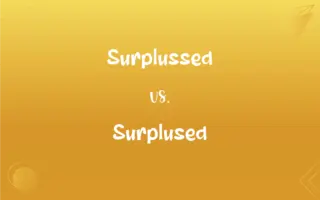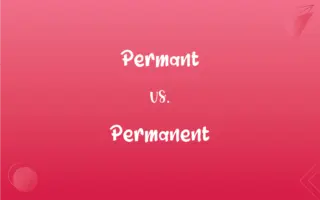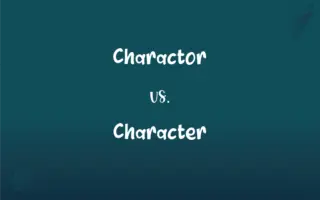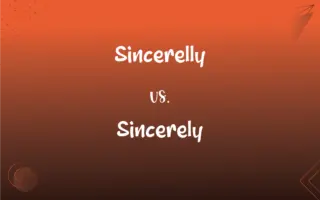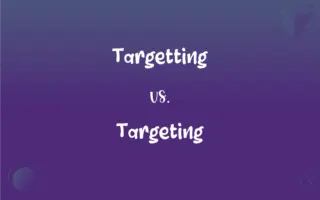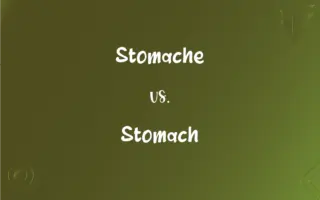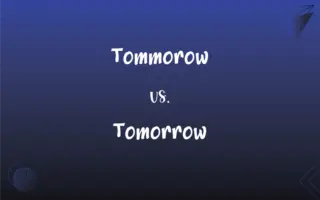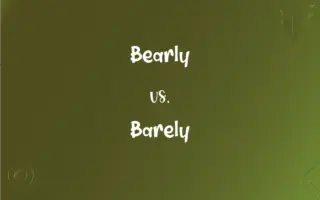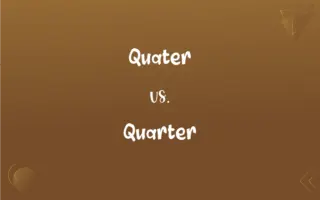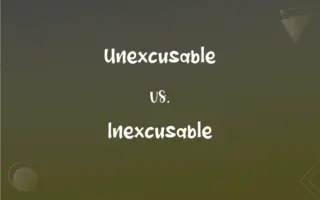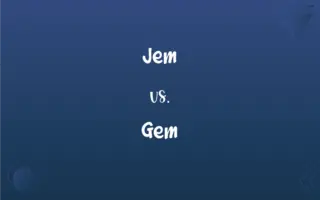Luky vs. Lucky: Mastering the Correct Spelling
Edited by Aimie Carlson || By Janet White || Published on March 15, 2024
"Luky" is incorrect, whereas "lucky" is the correct spelling, referring to having or bringing good fortune.

Which is correct: Luky or Lucky
How to spell Lucky?

Luky is Incorrect

Lucky is Correct
ADVERTISEMENT
Key Differences
Think of "lucky" as "luck" with a "y" at the end to signify the adjective form.
Use the rhyme "If you're in muck, add a 'y' to luck" to remember the correct spelling.
Remember that "lucky" has the same number of letters as "luck," plus a "y."
Recall "luck" and add "y" to describe someone or something with good fortune.
Associate "lucky" with "happy"; both end with "y" and denote positive outcomes.
ADVERTISEMENT
Correct usage of Lucky
Finding a four-leaf clover is considered very luky.
Finding a four-leaf clover is considered very lucky.
She won the game because she was more luky.
She won the game because she was more lucky.
He felt very luky to have found his lost wallet.
He felt very lucky to have found his lost wallet.
That was a luky guess; I didn't actually know the answer.
That was a lucky guess; I didn't actually know the answer.
He's always so luky when it comes to raffles and lotteries.
He's always so lucky when it comes to raffles and lotteries.
Lucky Definitions
Lucky means favored by luck; fortunate.
He felt lucky to find a dollar on the ground.
Lucky can refer to someone who is successful by chance rather than through their actions.
She's lucky in love.
Lucky is used to describe objects or tokens believed to bring good luck.
This necklace is my lucky charm.
Lucky describes something that occurs by chance in a favorable way.
That was a lucky shot during the game.
Lucky also means opportune or happening at the right moment.
It was a lucky coincidence that we met.
Having or attended by good luck.
Believed to bring good luck
Hoped to draw a lucky number.
Lucky Sentences
It was a lucky shot that won the game.
They say you're lucky if you find a penny heads up.
I was lucky to get the last ticket to the concert.
That was a lucky escape from a dangerous situation.
She feels lucky to have landed her dream job.
It's lucky to have good weather on your wedding day.
Finding a parking spot right in front of the store was lucky.
She considers herself lucky to have such supportive friends.
He was lucky to have avoided the accident.
They had a lucky win in the last second of the game.
He's had a lucky streak at the casino lately.
I had a lucky break when I found some money on the street.
Being chosen as the team captain was a lucky turn of events for her.
He considers his lucky number to be seven.
The lucky winner of the raffle will get a brand new car.
It's considered lucky to throw coins into a fountain and make a wish.
Winning the lottery is a once-in-a-lifetime lucky event.
Finding a lucky charm can make someone feel more confident.
He always wears his lucky hat when his team plays.
A lucky find at the flea market turned out to be valuable.
She wore her lucky bracelet to the interview and got the job.
You're lucky to have seen that rare bird in your backyard.
Having a black cat cross your path is considered unlucky, but I think they bring lucky vibes.
They were lucky to travel the world and experience different cultures.
The fisherman considered himself lucky to catch such a big fish.
Lucky Idioms & Phrases
Better to be lucky than good
Suggesting that it is better to be fortunate than skilled.
He won the game with a blind shot—better to be lucky than good.
Lucky streak
A series of fortunate events.
She's on a lucky streak, winning three games in a row.
Lucky charm
An object believed to bring good luck.
She carries a rabbit's foot as her lucky charm.
Lucky break
An unexpected opportunity or piece of good fortune.
Landing that role was his lucky break in the acting industry.
Born under a lucky star
To be born into good fortune or to have a life filled with good luck.
He must have been born under a lucky star to have such a successful career.
Lucky dip
A game or lottery where prizes are hidden in a container and winners are selected by chance.
The kids enjoyed the lucky dip at the school fair.
Strike it lucky
To suddenly have good luck.
He struck it lucky when he found a rare coin in his backyard.
Lucky guess
A correct guess made by chance.
I didn't know the answer; it was just a lucky guess.
Lucky dog
Someone who is very lucky.
You're a lucky dog for winning that trip to Hawaii.
Lucky in love
Successful and happy in romantic relationships.
They say I'm lucky in love because I've found the perfect partner.
Lucky shot
A successful attempt or outcome that was unlikely or unexpected.
Scoring from midfield was really a lucky shot.
Lucky escape
Narrowly avoiding a bad situation.
Surviving that car accident was a lucky escape.
Lucky star
A symbol or entity believed to bring good luck.
Thank your lucky star that you found your keys.
As lucky as a four-leaf clover
Extremely lucky.
Finding your lost ring in the park was as lucky as a four-leaf clover.
FAQs
Why is it called lucky?
It is called "lucky" because it describes conditions or events that are fortunate, coming from the concept of "luck."
What is the pronunciation of lucky?
Lucky is pronounced as /ˈlʌk.i/.
What is the root word of lucky?
The root word is "luck," with "y" added to form the adjective.
What is the verb form of lucky?
"Lucky" does not have a verb form as it is an adjective; the related verb would be "luck out."
Which vowel is used before lucky?
The vowel "a" is used before "lucky," as in "a lucky person."
Which conjunction is used with lucky?
The conjunction "and" can be used with lucky.
Which article is used with lucky?
Both "a" and "the" can be used with lucky, depending on the context.
What is the plural form of lucky?
As an adjective, "lucky" does not have a plural form; it remains "lucky."
Which preposition is used with lucky?
The preposition "to" is used with lucky, as in "lucky to have."
Is lucky a noun or adjective?
Lucky is an adjective.
Is lucky a countable noun?
Lucky is not a noun; it's an adjective and thus not countable.
Is lucky an adverb?
No, lucky is not an adverb.
Is lucky a negative or positive word?
Lucky is a positive word.
What is the singular form of lucky?
"Lucky" is an adjective; it does not change between singular and plural.
Is lucky an abstract noun?
Lucky is an adjective, not a noun.
Is the lucky term a metaphor?
"Lucky" can be used metaphorically to describe fortunate situations.
What part of speech is lucky?
Lucky is an adjective.
What is the opposite of lucky?
The opposite of lucky is "unlucky."
What is the third form of lucky?
Similarly, this does not apply to "lucky" as it is not a verb.
Is lucky a vowel or consonant?
The word "lucky" starts with a consonant.
What is another term for lucky?
Another term for lucky is "fortunate."
Which determiner is used with lucky?
Determiners like "the," "a," "my," or "this" can be used with lucky.
What is the first form of lucky?
"Lucky" does not have verb forms; it remains "lucky" as an adjective.
What is the second form of lucky?
This is not applicable to "lucky" as it is not a verb.
How many syllables are in lucky?
There are two syllables in lucky.
Is lucky a collective noun?
No, lucky is an adjective, not a noun.
Is the word lucky is imperative?
The word "lucky" is not imperative; it's descriptive.
How do we divide lucky into syllables?
Lucky is divided into syllables as luck-y.
What is a stressed syllable in lucky?
The first syllable "luck" is stressed in lucky.
How is lucky used in a sentence?
She considered herself lucky to have such supportive friends.
About Author
Written by
Janet WhiteJanet White has been an esteemed writer and blogger for Difference Wiki. Holding a Master's degree in Science and Medical Journalism from the prestigious Boston University, she has consistently demonstrated her expertise and passion for her field. When she's not immersed in her work, Janet relishes her time exercising, delving into a good book, and cherishing moments with friends and family.
Edited by
Aimie CarlsonAimie Carlson, holding a master's degree in English literature, is a fervent English language enthusiast. She lends her writing talents to Difference Wiki, a prominent website that specializes in comparisons, offering readers insightful analyses that both captivate and inform.



